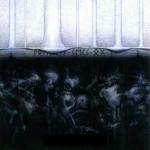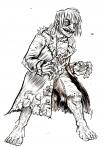Oh, I don't mind the seeming absence of a "coherent main plot" as much as others, maybe. I find the fact of interwoven, interrelated narrativeS (plural) to be quite pleasing, as long as the narrative that I'm presently reading is interesting enough in its own rights as well. I'm finding a few of them very good, but a couple of them really dopey, as I proceed through GotM -- it's like, "Oh darn, that stuff about So-and-so is over, and now we have to go back to that stupid Somewhere-and-such to deal with those idiots again, drat" and I start to think maybe I'll jump pages. But generally the author doesn't seem as bad as that, I'm creating a hyperbolic example. Mostly he manages to convince me that plots A and B are going to matter to plot C early enough. Some of the new settings bug me a bit, and I'm starting to notice a few missed opportunities or obvious devices, but maybe that's because I'm too cynical a reader in the first place, deliberately going out of my way to find out where the author "screwed up" sort of.
Anyway, on the question of world-building in the Malazan parts that I've read (only the first 1/4 to 1/3 of GotM) -- as a first-time reader of it, I don't find it overly burdensome. There's not the annoying "now, you see, there were seven different ancient races, the Thulgog and the Thulgamaog and the Fruglethulgog foremost among them. Let me now explain the relationships between the Thulgog and the Fruggle...". That just sucks when you do run into it. It gets old, pompous, uninteresting, and just plain boring. In fact, as an avid student of this stuff, I'd guess that an author over-explaining is probably the most common BAD aspect of badly written fantasy novels. Here's an example everybody probably has read: I think Tolkien gets a bit too explain-y roughly at the point of the Council of Elrond in the Fellowship of the Ring. First we hear about the history of Gondor, then it's off to some extra annoying talk talk talk talk about enmity between elves and dwarves, then the history of Moria, then the relationship between ... oh jeez just get on with it. I think Tolkien was deliberately giving readers an overt sense of the complexity and viability of his world, making that as a deliberate choice. "Better give them some real old-fashioned history textbook now." But that's a choice which would have been at least partly motivated by the time in which the work was being written. There was the author's awareness that he was doing something almost entirely new -- world-building and fantasy were minor genres at the time, with only a few precursors (Edgar Rice Burroughs, f.e.) whom Tolkien could have relied upon as being familiar to his intended reader(s). Different story by the 1990s when Erikson's stuff is coming out. By then any good readers have experienced a TON of world-built fictions with utterly new planets. Generic expectations would differ greatly from Tolkien's time to Erikson's.
In fact, if anything, GotM seems to me to err just a little bit in the opposite direction, not ENOUGH over-explaining. For example, we met the giant dragonfly creatures upon which our soldiers were going to travel through the air, and we heard about the flapping. But we didn't get ANY description of a character's experiences UP THERE in the air. "Whoa, I can see a long way down. That's kinda scary!" or whatever. So far in what I have read, there have been three, four major episodes in which I've been told that the characters last night or yesterday were flying elsewhere a long ways away on the backs of the giant dragonflies, but there's been literally no examination of any character's emotions DURING the flight. That sounds a little to me like an author going out of his way to NOT belabor his worldly creation invention things. Or another example, nothing anywhere says that a Barghoul is a RACE of creature. I had to look it up in the index, didn't know WTF was going on there when we first met one. I was wondering, "So, is that something that hangs out in a tavern? The job of serving wench, the job of bar-keeper, the job of bar-ghoul, the job of scullery maid ...". Later I realized I was misunderstanding something, and finally figured it out. Could have done with an explanation. Or maybe I missed it, reading too fast? Or maybe or maybe or maybe ... But that's just about Erikson.
More important to me for this discussions is how would MY OWN works come out? My concern is, that when I'm writing my fiction, sometimes I don't know what's reasonable. For example, I send my characters into outer space. Chapter five, they're off on the other orbiting celestial body, and they're having fun bouncing around because the gravity is low there. Someone decides to play a game of golf on this moon. Whack! How far does the ball go? Is it sensible to say that it entered orbit? Or just, that it traveled forty miles? Or, nine hundred yards? I don't want to figure out all the goldurned physics of it, right there when I'm getting the creative juices going about how character QRST just realized that he could open a golfing range for visitors to this new planet and make some money. I need to just, kind of, KNOW how far the ball went. And everything else. I need to KNOW it right away, and I need it to not get worked out later by nerdlinger readers who catch me out by pointing out that in chapter eleven I claimed that this moon was about six hundred miles in diameter and therefore the gravity would probably have worked out to be such-and-so and thus the golf ball would likely not have gone the distance I said it would.
See how it can go wrong? Tolkien did himself the favor of keeping it all on Earth, but just renaming most of Earth and rearranging what was already familiar. The instant you start adding other things, like different gravity, you start getting other effects. For example, in GotM there's the Moon's Spawn thing floating up there in the sky. It sounds like it's big enough to count as a spare mountain in size, and I think that might have a little bit of its own micro-gravity. But would that extra bit of gravity, when it moves nearer or farther from the city of Pale, affect the tides in the lake? What about grass, can it actually cause the tall, flimsy wheat on the planet's open grasslands to sway a bit to the side if it gets low enough on the horizon of the planet? Is Erikson going to use that idea, or am I supposed to just not think about it? I don't really mind, for the purposes of GotM and the enjoyable reading that's going on. But I do worry that I might start introducing that kind of question into the minds of my readers, if I happen to create something with similar problems. And gravity is just one rather obvious example. What about other potential contradictions? In political histories, in language roots, in racial characteristics, in any of your fictional world-building ... how do you know that you've done too much or not enough?
Humph. Same question.
This post has been edited by cliftonprince: 07 March 2016 - 05:09 AM

 Help
Help















